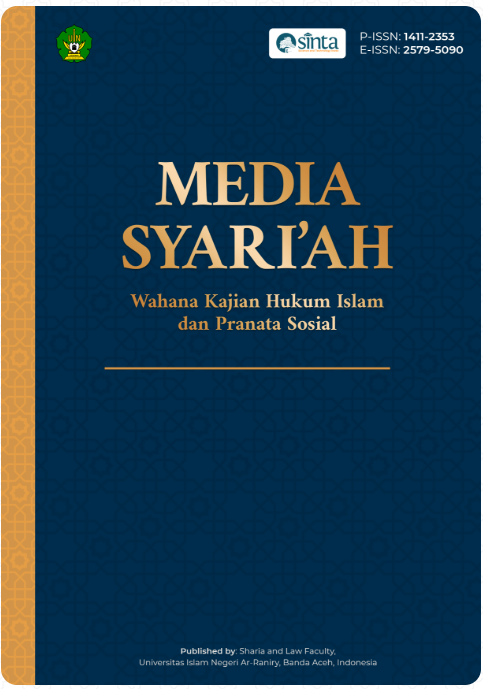The Marriage Model in the Gayo Community and Its Impact on the Inheritance System
DOI:
https://doi.org/10.22373/jms.v26i1.22180Keywords:
Marriage Model, Gayo Community, Inheritance System, Islamic LawAbstract
The issue of inheritance is closely related to kinship ties, both blood and marital. An example of marriage model in the Gayo community differs from other Acehnese communities, thus leading to different inheritance practices. The Gayo community recognizes three marriage models: jeulen, angkap, and kuso-kini. This is interesting to study in relation to the inheritance system in the Gayo community and its connection to these marriage models. Research findings indicate that inheritance practices in some parts of the Gayo community are greatly influenced by their marriage models. For instance, female children who marry jeulen may not receive inheritance rights, while male children who marry angkap may also be excluded from inheritance. According to traditional Gayo leaders, the inheritance system in the Gayo community is not directly influenced by their marriage system, as they adhere to Islamic inheritance laws. Any deviation from Islamic inheritance laws is attributed to the ignorance of village authorities or the heirs themselves, rather than customary practices. The research also found other inheritance issues practiced by the Gayo community, such as equal distribution of inheritance based on responsibilities towards parents and family. The study also revealed various cultural practices in the Gayo community that warrant further serious and in-depth research, both in terms of marital customs and inheritance systems (such as cases where parents are not given inheritance rights when the heir is still alive), and other related matters.References
Al-Zuhaili, W. (2006). al-Fiqh al-Islamy wa Adillatuhu. Dar al-Fikr.
Albar, M. (1994). Wanita Karir Dalam Timbangan Islam. Pustaka Azzam.
Ash-Shabuni, M. A. (1979). Al-Mawaris fi al-Syari’ati al-Islami. ’Alim al-Kutub.
Ash-Shiddieqy, M. H. (2011). Fiqh Mawaris; Hukum Pembagian Warisan Menurut Syariat Islam (Cet. 3). Pustaka Rizki Putra.
Auni, L. (2021). Adat Istiadat Perkawinan; Perubahan Pola dan Prosesi Adat Perkawinan Suku Gayo. Naskah Aceh.
Budiono, R. (1999). Pembaharuan Hukum Waris Islam di Indonesia. PT Citra Aditya Bakti.
Munawaroh, L. S. (2020). Menelisik Hak-Hak Perempuan. Kafa`ah Journal, 10(1), 14.
Rahman, F. (1994). Ilmu Waris. Al-Ma’arif.
Ramadhani, A. L. (2017). Wajah Antropologi Dan Sosiologi Hukum Keluarga Di Beberapa Daerah Indonesia” yang berjudul “Antropologi Hukum Keluarga Aceh – Gayo. Lembaga Kajian Konstitusi Indonesia (LKKI) Fakultas Syariah dan Hukum, Universitas Islam Negeri (UIN) Ar-Raniry.
Syarifuddin, A. (2004). Hukum Kewarisan Islam. Prenada Media.
Tahir, M. (2016). Perempuan Dalam Bingkai Hak Asasi Manusia Dalam Hukum Keluarga Islam. Musãwa, 15(1), 14.
Wati, R. (2017). Pembagian Harta Warisan Berdasarkan Hukum Adat Gayo. PPs UIN Ar-Raniry.
Downloads
Published
Issue
Section
License
MEDIA SYARI'AH: Wahana Kajian Hukum Islam dan Pranata Sosial has CC-BY-SA or an equivalent license as the optimal license for the publication, distribution, use, and reuse of scholarly work. Authors who publish with this journal agree to the following terms:
1. Authors retain copyright and grant the journal right of first publication with the work simultaneously licensed under a Creative Commons Attribution-ShareAlike 4.0 International License that allows others to share the work with an acknowledgment of the work's authorship and initial publication in this journal.
2. Authors are able to enter into separate, additional contractual arrangements for the non-exclusive distribution of the journal's published version of the work (e.g., post it to an institutional repository or publish it in a book), with an acknowledgment of its initial publication in this journal.
3. Authors are permitted and encouraged to post their work online (e.g., in institutional repositories or on their website) prior to and during the submission process, as it can lead to productive exchanges, as well as earlier and greater citation of published work (See The Effect of Open Access).
You are free to:
Share — copy and redistribute the material in any medium or format.
Adapt — remix, transform, and build upon the material for any purpose, even commercially.
The licensor cannot revoke these freedoms as long as you follow the license terms.
All papers published in MEDIA SYARI'AH: Wahana Kajian Hukum Islam dan Pranata Sosial are licensed under a Creative Commons Attribution-ShareAlike 4.0 International License.




.png)


.png)
.png)
.png)



